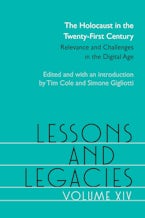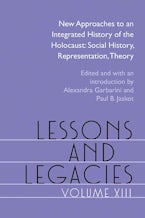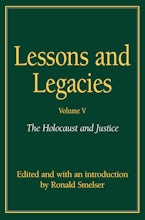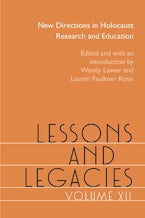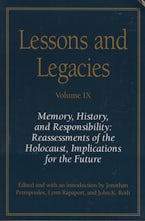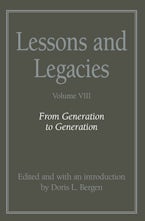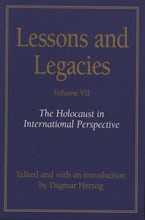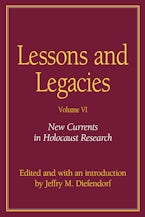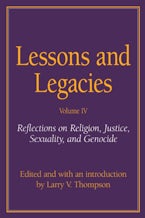Lessons & Legacies
Each volume of essays in the Lessons and Legacies series publishes essays examining issues surrounding the Holocaust and Holocaust education; the volume of essays is supported in part by the Holocaust Educational Foundation in Skokie, Illinois.
Showing results 1-10 of 15
Filter Results OPEN +

Lessons and Legacies XV
A collection of new research in Holocaust studies from the fields of history, literature, and memory studies
Lessons and Legacies XIV
This book reevaluates concepts such as Primo Levi’s “gray zone” and uses digital methodologies to examine mobility and space and their relationship to hiding, resistance, and emigration, focusing on the histories of individuals and social groups.
Lessons and Legacies XIII
Lessons and Legacies XIII: New Approaches to an Integrated History of the Holocaust is an edited collection of thirteen original essays that reflect current research on the Holocaust in a range of disciplines....
Lessons and Legacies V
How can one link the Holocaust and justice, given the enormity of the Holocaust? Is justice even possible for a crime of such magnitude, and if so, what kind of justice? Weighing these questions and their implications, a group of distinguished scholars attempts to untangle the complex and often contradictory conjunction of the Holocaust and justice.
Lessons and Legacies XII
The essays in Lessons and Legacies XII present the most cutting-edge methods and topics shaping Holocaust studies today, from a variety of disciplines: forensics, environmental history, cultural studies, religious studies, labor history, film studies, history of medicine, sociology, pedagogy, and public history.
Lessons and Legacies IX
Memory, History, and Responsibility: Reassessments of the Holocaust, Implications for the Future contains the highlights from the ninth "Lessons and Legacies" conference. The conference, held during the height of the genocide in Darfur, sought to reexamine how the darkness of the Holocaust continues to shadow human existence more than sixty years after World War II left the Third Reich in ruins.
Lessons and Legacies VIII
Primo Levi opened his memoir Survival in Auschwitz with a call to remember, reflect upon, and teach about the Holocaust—or to face the rejection of subsequent generations. The transmittal of this urgent knowledge between generations was the theme of the eighth Lessons and Legacies Conference on the Holocaust, and it is the focus of this volume. The circular formulation—from generation to generation—points backward and forward: where do we locate the roots of the Holocaust, and how do its repercussions manifest themselves? The contributors address these questions from various perspectives—history, cultural studies, psychiatry, literature, and sociology. They also bring to bear the personal aspect of associated issues such as continuity and rupture. What has the generation of the Shoah passed on to its descendants? What have subsequent generations taken from these legacies? Contributions by scholars, some of whom are survivors and children of survivors, remind us that the Holocaust does—and must—remain present from...
Lessons and Legacies VII
As the discipline of Holocaust studies matures, new questions and themes come to the fore. Among these are critical issues that receive serious scholarly attention, often for the first time, in this collection of essays by some of the world's most respected experts in the field. Greed and theft as motives for Holocaust perpetrators and bystanders; sexual violence and what it tells us about the experiences of both victims and perpetrators; collaboration with Nazis among the local populations of the ever-moving Eastern front; the durability of anti-Semitism after 1945; and the perspectives of the Soviet military and Soviet leadership on Nazi crimes: these are some of the topics the authors address as they extend the boundaries of Holocaust scholarship beyond the central loci of the planning and execution of technologized mass murder--Germany and Poland--and into ghettos and killing fields in Ukraine and Belarus, as well as spaces whose boundaries and...
Lessons and Legacies VI
In the courtroom and the classroom, in popular media, public policy, and scholarly pursuits, the Holocaust-its origins, its nature, and its implications-remains very much a matter of interest, debate, and controversy. Arriving at a time when a new generation must come to terms with the legacy of the Holocaust or forever lose the benefit of its historical, social, and moral lessons, this volume offers a richly varied, deeply informed perspective on the practice, interpretation, and direction of Holocaust research now and in the future. In their essays the authors-an international group including eminent senior scholars as well those who represent the future of the field-set the agenda for Holocaust studies in the coming years, even as they give readers the means for understanding today's news and views of the Holocaust, whether in court cases involving victims and perpetrators; international, national, and corporate developments; or fictional, documentary, and historical accounts.
Lessons and Legacies IV
Essays that illustrate new areas of concern within Holocaust study and that explore neglected issues such as gender and place.

Lessons and Legacies XV
A collection of new research in Holocaust studies from the fields of history, literature, and memory studies
Lessons and Legacies XIV
This book reevaluates concepts such as Primo Levi’s “gray zone” and uses digital methodologies to examine mobility and space and their relationship to hiding, resistance, and emigration, focusing on the histories of individuals and social groups.
Lessons and Legacies XIII
Lessons and Legacies XIII: New Approaches to an Integrated History of the Holocaust is an edited collection of thirteen original essays that reflect current research on the Holocaust in a range of disciplines....
Lessons and Legacies V
How can one link the Holocaust and justice, given the enormity of the Holocaust? Is justice even possible for a crime of such magnitude, and if so, what kind of justice? Weighing these questions and their implications, a group of distinguished scholars attempts to untangle the complex and often contradictory conjunction of the Holocaust and justice.
Lessons and Legacies XII
The essays in Lessons and Legacies XII present the most cutting-edge methods and topics shaping Holocaust studies today, from a variety of disciplines: forensics, environmental history, cultural studies, religious studies, labor history, film studies, history of medicine, sociology, pedagogy, and public history.
Lessons and Legacies IX
Memory, History, and Responsibility: Reassessments of the Holocaust, Implications for the Future contains the highlights from the ninth "Lessons and Legacies" conference. The conference, held during the height of the genocide in Darfur, sought to reexamine how the darkness of the Holocaust continues to shadow human existence more than sixty years after World War II left the Third Reich in ruins.
Lessons and Legacies VIII
Primo Levi opened his memoir Survival in Auschwitz with a call to remember, reflect upon, and teach about the Holocaust—or to face the rejection of subsequent generations. The transmittal of this urgent knowledge between generations was the theme of the eighth Lessons and Legacies Conference on the Holocaust, and it is the focus of this volume. The circular formulation—from generation to generation—points backward and forward: where do we locate the roots of the Holocaust, and how do its repercussions manifest themselves? The contributors address these questions from various perspectives—history, cultural studies, psychiatry, literature, and sociology. They also bring to bear the personal aspect of associated issues such as continuity and rupture. What has the generation of the Shoah passed on to its descendants? What have subsequent generations taken from these legacies? Contributions by scholars, some of whom are survivors and children of survivors, remind us that the Holocaust does—and must—remain present from...
Lessons and Legacies VII
As the discipline of Holocaust studies matures, new questions and themes come to the fore. Among these are critical issues that receive serious scholarly attention, often for the first time, in this collection of essays by some of the world's most respected experts in the field. Greed and theft as motives for Holocaust perpetrators and bystanders; sexual violence and what it tells us about the experiences of both victims and perpetrators; collaboration with Nazis among the local populations of the ever-moving Eastern front; the durability of anti-Semitism after 1945; and the perspectives of the Soviet military and Soviet leadership on Nazi crimes: these are some of the topics the authors address as they extend the boundaries of Holocaust scholarship beyond the central loci of the planning and execution of technologized mass murder--Germany and Poland--and into ghettos and killing fields in Ukraine and Belarus, as well as spaces whose boundaries and...
Lessons and Legacies VI
In the courtroom and the classroom, in popular media, public policy, and scholarly pursuits, the Holocaust-its origins, its nature, and its implications-remains very much a matter of interest, debate, and controversy. Arriving at a time when a new generation must come to terms with the legacy of the Holocaust or forever lose the benefit of its historical, social, and moral lessons, this volume offers a richly varied, deeply informed perspective on the practice, interpretation, and direction of Holocaust research now and in the future. In their essays the authors-an international group including eminent senior scholars as well those who represent the future of the field-set the agenda for Holocaust studies in the coming years, even as they give readers the means for understanding today's news and views of the Holocaust, whether in court cases involving victims and perpetrators; international, national, and corporate developments; or fictional, documentary, and historical accounts.
Lessons and Legacies IV
Essays that illustrate new areas of concern within Holocaust study and that explore neglected issues such as gender and place.


